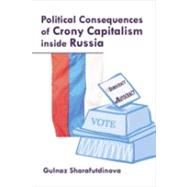Political Consequences of Crony Capitalism Inside Russia
, by Sharafutdinova, Gulnaz- ISBN: 9780268041359 | 0268041350
- Cover: Paperback
- Copyright: 1/15/2011
This book examines the coexistence of crony capitalism and traditionally democratic institutions such as political competition and elections in Russia after the collapse of communism. The combination, Gulnaz Sharafutdinova argues, has produced a distinct pattern of political evolution in contemporary Russia. Elections are meant to ensure government accountability and allow voters to elect a government responsive to their needs, but in postcommunist Russia the institutional forms of democracy did not result in the expected outcomes. Instead, democratic institutions in the context of crony capitalism--in which informal elite groups dominate policy making, and preferential treatment from the state, not market forces, is crucial to amassing and holding wealth--were widely devalued and discredited. As Sharafutdinova demonstrates, especially through her close scrutiny of elections in two regions of Russia, Nizhnii Novgorod and the Republic of Tatarstan, crony capitalism made elections especially intense struggles among the elites. Massive amounts of money flowed into campaigns to promote candidates by discrediting their rivals, money purchased candidates and power, and elites thereby solidified their control. As a result, the majority of citizens perceived elections as the means for the elite to access power and wealth rather than as expressions of public will. Through her detailed case studies and her analyses of contemporary Russia in general, Sharafutdinova argues persuasively that the turn toward authoritarianism associated with Vladimir Putin and supported by a majority of Russian citizens was a negative political response to the interaction of electoral processes and crony capitalism. "This is one of the most interesting and well-argued books I have read recently on the question of democracy in Russia, and its bold thesis is likely to appeal well beyond students of Russia to the much larger number of readers (and students) interested in general questions of democratization and problems of corruption." -- Henry Hale, George Washington University "Gulnaz Sharafutdinova explores the development of crony capitalism in Russia, based on the contrasting cases of Tatarstan and Nizhnii Novgorod. She argues that the corruption which accompanied the market transition seeped over into electoral politics, and was a major factor in undermining popular support for democratic institutions. This finding is a challenge to transition theory, which posits that democracy and capitalism work hand in hand. Few scholars have tackled the question of exactly how and why Russian democracy eroded as quickly as it sprang up. Sharafutdinova's book is an important contribution to that debate." -- Peter Rutland, Wesleyan University "This well-argued and convincingly documented book will be of interest to scholars of Russian politics, and corruption more broadly, as well as to policymakers interested in getting an overview of the logic of the Yeltsin years and the Putin response." -- Anna Grzymala-Busse, University of Michigan







